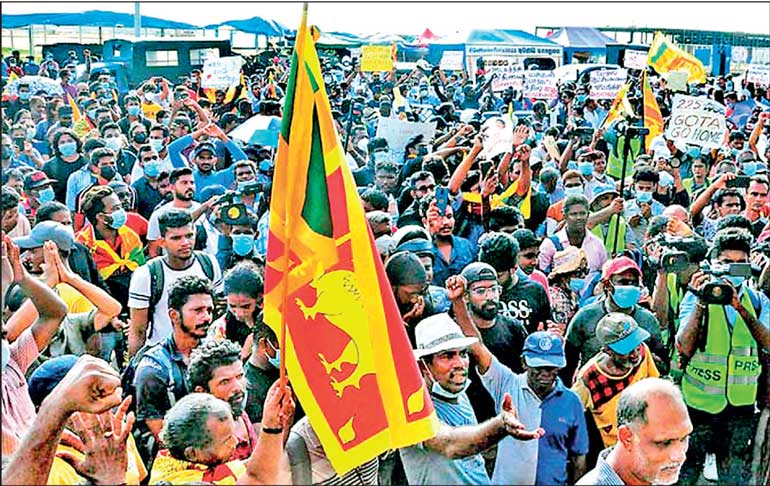Sunday Apr 20, 2025
Sunday Apr 20, 2025
Saturday, 13 August 2022 00:11 - - {{hitsCtrl.values.hits}}

Politics is the soil in which the nettle of poisonous enmity, evil suspicions, shameless lies, slander, morbid ambitions, and disrespect for the individual grows rapidly and luxuriantly. Name anything bad in man and it is precisely in the soil of political struggle that it grows with particular liveliness and abundance – Maxim Gorky
 Maxim Gorky, a long-time friend of Lenin made this scathing condemnation of politics when he saw the genuine uprising of the Russian people hijacked by ‘dirty hands’ and ‘greedy pockets’.
Maxim Gorky, a long-time friend of Lenin made this scathing condemnation of politics when he saw the genuine uprising of the Russian people hijacked by ‘dirty hands’ and ‘greedy pockets’.
Revolutions, uprisings, or struggles, call it by whatever name you wish, don’t end the way its planners, instigators or volunteers intended. Often, they end with unexpected results and tortuous outcomes that promise more chaos. Of that we can be sure.
On 9 August 2022, our new President constitutionally elected by Parliament made his first official visit to the Army Headquarters Complex at Akuregoda.
In utter amazement I watched the grand event on television. With absolute fascination I listened to his address to the military establishment.
President Wickremesinghe’s brief yet loaded remarks reminded me of a beguiling analysis of the manipulative political mind that is in pursuit of quintessential power.
Journalist Robert Caro in his book ‘The Passage of Power: The Years of Lyndon Johnson (2012)’ says: “Power always reveals. When a man is climbing, trying to persuade others to give him power, concealment is necessary. But, as soon as the man obtains more power, camouflage becomes less necessary.”
Caro concludes “… it is not that the power corrupts or is magnetic to the most corruptible. The truth is – power only reveals who you truly are.”
Gotabaya Rajapaksa made Ranil Wickremesinghe acting president before he left the republic. It was one and a half days later that he offered his resignation from Singapore.
After President Gotabaya Rajapaksa left the shores of Sri Lanka, our Constitutional President was either acting president or interim president. During this time the protestors, the mob, the hooligans, well-meaning and innocent youth (take your pick) were in occupation of the Presidential Secretariat and the President’s House.
Of course, they were engaged in civil disobedience. They were in violation of the law. There was also a tacit empathy between the law breakers and law enforcers. Law enforces did not demand their Civil Obedience without a court order.
The coercive power of the State was irrevocably and unmistakably unleashed against the ‘Aragalaya’ only after Parliament voted 134 to 82 to make Ranil Wickremesinghe the president of the republic on 20 July 2022.
President Wickremesinghe’s desire to restore the rule of law is understandable. In these troubled times we must ponder over the nature of power and violence with open minds. That the Government as an institution holds a monopoly on the legitimate use of violence is a foundational premise.
A mindless mob engaged in sheer vandalism is the new narrative. In retrospect we mustn’t be surprised at this turn of events.
A socio-political movement spontaneous and leaderless cannot be sustained when the State turns on its repressive machinery.
Sooner or later the ordinary people who flocked to swell its ranks discover other priorities.
Without a clear political objective beyond the slogan ‘Gota Go Home’ it was a matter of time for it to spin out of control.
There can be some criminal elements who will take advantage of street protests. But street protests are made by ordinary people. Ordinary people have grievances. They are not criminals. What we witnessed was a modern-day urban protest. It was an explosion of socio-economic discontent. It was a marvellously transparent affair. Everyone with a smart phone was an activist, reporter and commentator. The exceptionally gifted produced documentaries and sitcoms.
It opened a parallel universe. In the deepest recesses of our dysfunctional democracy we found millions of people with accumulated frustrations, alienation, and bitter resentment.
Those resentments have not been addressed. The ‘Aragalaya’ is by no means over. Gale Face is only a beginning. It was a chaotic release of pent-up discontent. It was exhaustingly cathartic. Monotonous and innocuous lives suddenly found excitement and the promise of a spectacle of a lifetime.
But something far more important happened. The people found a voice. The masses, the mob, the rabble call them what you will, have found that their genuine grievances have created a liberating sense of solidarity, community, and collective strength.
Rule of law is light years away from rule of power. Rule of law in the hands of an imaginative leader trusted by the people can reach awesome heights and achieve miraculous feats. A fragile leadership that is not trusted by the people sooner than later discovers the convenience of the rule of power.
Political philosopher Hannah Arendt famously warned about the perils of engineered power as opposed to the moral exercise of power. “Power and violence are opposites; where the one rules absolutely, the other is absent. Violence appears where power is in jeopardy but left to its own course it ends in power’s disappearance.”
Only insecure leader sought power for its own sake.
She warns about state violence used as an attempt to hold onto power. The violence deployed is indicative of the perceived loss of power and influence of a leader. There is no way to legislate public trust.
The Aragalaya has vacated Galle Face grounds. But it lives on in the hearts and minds of people. How many hearts and minds I do not know. Quantifying its strength will need a general election.
Meanwhile we can make a general assessment. Very ordinary people collectively reached a point when they decided to engage in a heart-breaking political struggle. They wanted a world in which human beings recognised the worth of each other and loved one another. They rejected the existing system where people swindled each other routinely and quite transparently!